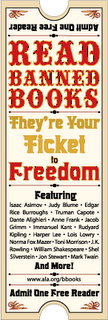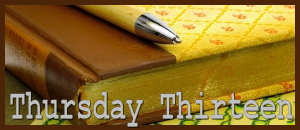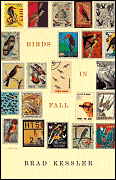I'm very pleased to present a special guest columnist from Smart Computing Magazine. Enjoy!Editorial License Each MonthOctober 2006 • Vol.17 Issue 10Page(s) 92 in print issue Editorial LicenseThe Gerbilization Of America
Editorial LicenseThe Gerbilization Of AmericaIt all started back in the ‘90s, as the World Wide Web for the first time opened up the Internet to millions of us who were neither academics nor engineers. By the end of the decade, practically everyone had a Web site. I know of house plants that have Web sites. (“Welcome to PlantsAtHome.com! My name is Doug. I’m a ficus belonging to Wanda Krieglehamer of Van Nuys, Calif. Currently, I am dropping leaves at the rate of three per hour, unless the cat walks by, at which point my shedding increases dramatically. Click here to meet Todd, the philodendron.”)
A case in point. . . . We have working here an otherwise perfectly normal, very intelligent young writer who—for reasons best known only to herself—oversees a Web site called TwinSqueaks.com. It’s devoted to . . . um, gerbils. (You know, gerbils? They’re little furry rodents; they look kind of like hamsters that’ve been on the South Beach Diet for a very long time. Of course, real pets view gerbils as nothing more than highly mobile snacks.) Now, this writer (no names, of course, but her initials are Kylee Dickey) operates TwinSqueaks.com on behalf of a small herd of gerbils named Pippi, Samantha, Hope, Maeby, and Nellie. All five of the little darlings are very cute, in a warm, fuzzy, nose-twitching, snack-like sort of way.
You and I may think it’s silly, but here’s the thing: These gerbils get fan mail! When’s the last time you got fan mail? Little kids from around the world write letters to them. They ask if it’s true that gerbils like to take sandbaths (yes, they do), they ask how to tame a gerbil (I suggest a very tiny whip and chair), and they ask if it’s OK to use pine bedding for their gerbils (no, because pine bedding sold in the United States can make a gerbil sick). And the gerbils answer the letters! Here’s one from Pippi in response to a child asking about handling techniques: “Dear C.: You can pick up most rodents by their tails, but not gerbils. If you tried to pick me up by my tail, you little brat, I’d whip around and bite your nose and rip it right off your smarmy little face! Then I’d run to your bed and vomit all over your pillow. By the way, I can get out of that stupid cage any time I want, you know, and sooner or later, you will have to sleep. . . .” [Letter edited for clarity.]
And now, as if the proliferation of Web sites weren’t bad enough, we have blogs. Essentially, blogs are online journals that cover really important issues such as politics, computers, literature, and the designated hitter rule. (And also some truly silly things such as calculus, ice hockey, and rap music.)
I can understand the urge to blog. We all have things to say, and the Internet is the perfect medium: It’s fast, it’s cheap, and it doesn’t care if you’re an idiot. And after all, a blog is really nothing more than an electronic version of the journals written throughout history by such luminaries as Samuel Pepys, James Boswell, Charles Darwin (and several other Darwins, in fact), Richard Henry Dana, Henry James, and countless others who contributed greatly to science, literature, and . . . well, journal-ism. (Although we should probably keep in mind that many of those people—though not Henry James—could actually write, of course. This no longer seems to be a prerequisite.) For whatever reason, people have always written journals and diaries and we have always hungered to read them.
But, as with Web sites a decade ago, it’s gotten out of hand; everyone now has a blog. (My wife began the decade as a confirmed technophobe; she now has three blogs.) The Internet is being “blogged down” (so to speak) by millions of people incessantly journaling about everything from rock collecting to rock music to Knute Rockne. But it doesn’t stop there. All of these bloggers include in their blogs links to other blogs they happen to like. Thus, checking one blog leads to a myriad of other blogs, each of which—naturally enough—includes links to still more blogs. You have to follow all of these links, of course. What if one of them went to something interesting and you missed out? (Sure, the odds are against it, but it could happen.)
Where will it all end? Between blogs, cell phones, email, text messaging, and the rest, millions of people are communicating like mad; it’s a veritable communicative frenzy. I wonder if anyone is actually saying anything.
by Rod Scher
Rod Scher is a former software developer and a recovering English teacher. He's also the publication editor of Smart Computing and will no doubt continue in that position until such time as his boss reads this column. Contact Rod at rod-scher@smartcomputing.com.

















